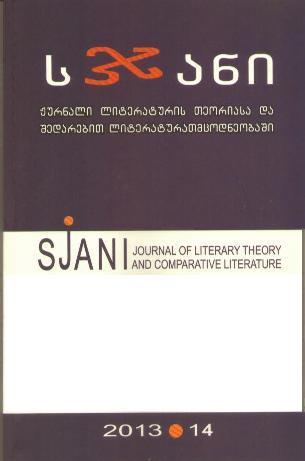აკაკი წერეთლის უცნობი რუსულენოვანი ავტოგრაფები (ტექსტოლოგიური ანალიზი)
Akaki Tsereteli’s Unknown Russian Autographs (Textual Criticism Analysis)
Author(s): Maia NinidzeSubject(s): Literary Texts
Published by: ლიტერატურის ინსტიტუტის გამომცემლობა
Keywords: textual criticism; journalism; unknown autographs; Akaki Tsereteli; history of Georgian church; history of Georgian theatre.
Summary/Abstract: Akaki Tsereteli’s Unknown Russian Autographs (Textual Criticism Analysis) Summary Key words: textual criticism, journalism, unknown autographs, Akaki Tsereteli, history of Georgian church, history of Georgian theatre. There are several very important unpublished autographs kept in Akaki Tsereteli’s private archive at Georgian National Center of Manuscripts. Text, written on two pieces of paper and titled as “The Autocephaly of the Georgian Church” is neither dated nor signed. The handwriting is fast and not clearly legible. The calligraphy belongs to Akaki Tsereteli. It begins with the information about the heated debates in the Holy Synod concerning the autocephaly of the Georgian Church. The session, mentioned in the manuscript, was held akaki wereTlis ucnobi rusulenovani avtografebi on the 17-18-th of January in 1906. Accordingly, The text must be dated later than the event took place – after January 18. The article seems to be written with the purpose to express support for the position of the Georgian bishops – Kirion and Leonid declared at the Synod sessions. It describes History of Georgian church before the lost of its independence (in 1811) and after it. The poet writes that the abolishment of the patriarch’s chair and intensification of the russification policy caused spiritual degradation of the nation. Akaki Tsereteli also speaks about the appropriation of church lands by the State Treasury of the Russian Empire and about auctioning of the property, plundered from Georgian monasteries. In the end he comes to the conclusion: the rule of exarchs did so much harm to Georgian people that they got suspicious whether Russians were real orthodoxes or not. In Akaki Tsereteli’s opinion this was the reason that caused estrangement from the church. The nation which survived their faith from the 6-th to the 19-th centuries without any inclination, began to move to some other – non-orthodox churches. Another autograph, written on 8 pieces of paper in Russian and titled as “The Georgian Theatre” is not dated. In order to identify the time when it was written, we used information about some facts, given in the text. The author says that Taso Aabashidze’s benefit performance on January 26, described in the article, was held 15 years after her first aapearance on the stage. We compared this information with various documents of the period and came to the conclusion that the time interval “15 years” is not exact. The benefit performance was held 14 years after her first appearance on the stage in 1899. Thus the article must be written on January 26, 1913. This date is in full accordance with all the other facts, mentioned in the document. Akaki Tsereteli has written a number of articles on theatre in different years but the text of the autograph is very important as it is the last article on the subject which deeply analyses not only the problems existing in the theatre but general vices of our society as well.
Journal: სჯანი
- Issue Year: 2013
- Issue No: 14
- Page Range: 114-125
- Page Count: 11
- Language: Georgian

